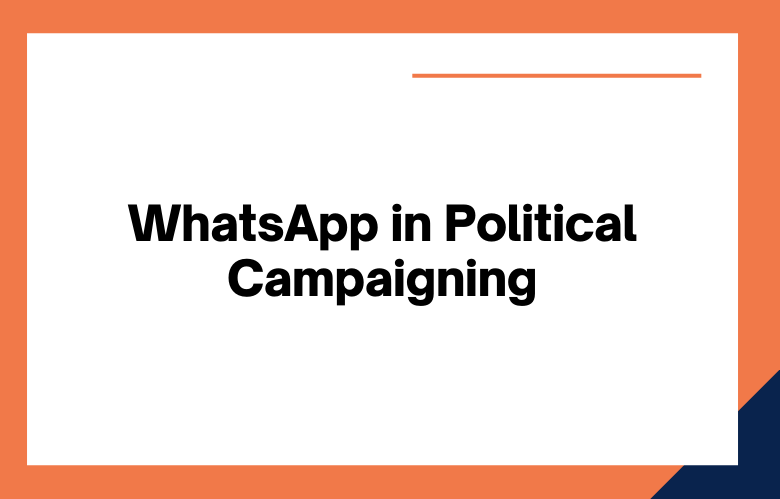
How to Send Political Messages on WhatsApp?
In today’s digital age, political communication has evolved, and WhatsApp is a powerful platform for connecting with the electorate. Sending political messages on WhatsApp can be a game-changer for politicians, parties, and activists. In this article, we’ll explore how to effectively utilize WhatsApp for political messaging, providing valuable insights and strategies to enhance your communication efforts.
How to Send Political Messages on WhatsApp?
WhatsApp is a widely used messaging app, and when it comes to political messaging, it offers a plethora of opportunities to engage your audience. In this section, we’ll dive into the specifics of sending political messages on WhatsApp.
WhatsApp Groups:
WhatsApp groups are an excellent tool for political communication. Create groups for different demographics, constituencies, or campaign teams. This enables targeted messaging, ensuring that your messages reach the right audience.
In a political campaign, you can create various groups based on different aspects, such as geographical location, interests, or demographics. For example, you might have one group for volunteers, another for potential donors, and yet another for constituents in a specific area. This segmentation allows you to tailor your messages more effectively, making your audience feel heard and understood. Additionally, it helps in managing large contact lists efficiently.
WhatsApp Broadcast Lists:
A broadcast list allows you to send messages to multiple contacts at once without revealing the recipients’ identities. It’s an efficient way to share campaign updates or political messages while respecting privacy.
When using WhatsApp Broadcast Lists, it’s crucial to remember that this feature is designed for one-way communication. Unlike groups, where members can interact and respond, broadcast lists offer more controlled message dissemination. This can be an advantage for sharing important announcements or breaking news without cluttering recipients’ inboxes.
WhatsApp Status:
Utilize the status feature to share images, videos, or text updates with your contacts. This is a great way to keep your audience informed about your political activities.
WhatsApp Status is a feature that allows you to share updates that disappear after 24 hours. It’s similar to the Stories feature on other social media platforms. As a political communicator, you can use this to your advantage by providing daily or real-time updates on your campaign or political activities. Share behind-the-scenes glimpses, event highlights, or short videos addressing key issues. This keeps your audience engaged and informed about your efforts.
WhatsApp Web:
Use WhatsApp Web to send messages from your computer, making it easier to manage your campaign communication, especially if you have a large contact list.
WhatsApp Web is a valuable tool for managing your WhatsApp conversations from your computer. It syncs with your mobile app, allowing you to send messages and media files more conveniently, particularly when dealing with a high volume of political messages. This feature is beneficial for those who prefer typing on a physical keyboard or need to multitask between devices while keeping their WhatsApp messages organized.
WhatsApp Encryption:
WhatsApp employs end-to-end encryption, ensuring the security and privacy of your messages. This is a vital feature when handling sensitive political information.
End-to-end encryption in WhatsApp is a security measure that ensures only you and the person you’re communicating with can read what is sent, and nobody in between, not even WhatsApp. This is crucial for political messaging, especially when dealing with sensitive information, policy proposals, or confidential discussions. Your constituents and supporters need to know that their communications are private and secure.
Best Practices for Effective Political Messaging
When sending political messages on WhatsApp, certain best practices can make a significant difference in your outreach efforts. Here are some key considerations:
Respect Privacy:
Always respect your contacts’ privacy. Ensure you have their consent before adding them to groups or sending campaign-related messages.
Respecting the privacy of your audience is paramount. You must obtain explicit consent from individuals before including them in your political groups or sending campaign-related messages. This is not only ethical but also a legal requirement in many regions. Implement a clear opt-in process to avoid spamming and to ensure that your political messages reach an engaged and receptive audience.
Message Content:
Craft clear and concise messages that resonate with your target audience. Highlight the benefits of your political message and avoid jargon.
The content of your political messages is the heart of your campaign. Keep your messages clear and concise, focusing on what matters most to your audience. Use language that resonates with them and avoid technical jargon or complex language that might alienate or confuse the reader. Emphasize the benefits of your message, showing how it aligns with the interests and concerns of your constituents.
Engagement:
Encourage engagement by asking questions or conducting polls in your groups. This fosters a sense of involvement and interaction.
Engagement is key to a successful political campaign. Use WhatsApp’s interactive features to your advantage. Ask questions, conduct polls, or host discussions in your political groups. This fosters a sense of involvement, and it also provides you with valuable feedback and insights into the concerns and opinions of your audience. Engaging with your constituents builds trust and a strong connection.
Timing:
Be mindful of the timing of your messages. Avoid sending messages during odd hours to avoid disturbing recipients.
Timing is a crucial factor in political messaging. Sending messages during inappropriate hours can lead to annoyance and reduced engagement. Always consider the time zones and daily routines of your target audience when scheduling your political messages. Aim to send messages during hours when people are likely to be receptive and not busy with other commitments.
Frequency:
Maintain a consistent but not overwhelming message frequency. Too many messages can lead to disengagement.
Finding the right balance in message frequency is essential. While you want to keep your audience informed and engaged, bombarding them with too many messages can lead to disengagement. Strike a balance by providing regular updates without overwhelming your audience. Quality and relevance should always take precedence over quantity.
Monitor Feedback:
Pay attention to feedback from your audience. Constructive criticism can help improve your messaging strategy.
Feedback is a valuable source of insights for refining your political messaging strategy. Pay close attention to the responses and feedback you receive from your audience. Constructive criticism can help you identify areas for improvement and enhance your approach. Act on the feedback you receive, making necessary adjustments to better align your messaging with the expectations and concerns of your constituents.
Frequently Asked Questions
Can I send political messages to anyone on WhatsApp?
Yes, you can send political messages, but it’s essential to respect privacy and obtain consent before sending unsolicited political content.
Sending political messages on WhatsApp is generally allowed, but it’s crucial to follow ethical and legal guidelines. Always respect the privacy of your contacts and obtain their consent before sending political messages, especially if you plan to include them in a political group or broadcast list.
Are there any restrictions on political content on WhatsApp?
WhatsApp has policies against spam and the spread of misinformation. Ensure that your political messages adhere to their guidelines.
WhatsApp has strict policies against spam and the spread of misinformation. It’s essential to ensure that your political messages align with WhatsApp’s terms of service. Avoid sending misleading or false information, as this can lead to your account being banned. Additionally, be cautious about sending unsolicited messages, as this can be perceived as spam.
How can I ensure my political messages are engaging?
Craft your messages with clarity, relevance, and call-to-action elements to engage your audience effectively.
Engaging political messages are crafted with clarity, relevance, and a clear call to action. Ensure that your messages are easy to understand and resonate with your target audience’s concerns and interests. Encourage interaction by including questions, polls, or discussion topics in your messages. This fosters engagement and keeps your audience involved in your political campaign.
Can I use WhatsApp for political fundraising?
WhatsApp can be used for political fundraising by sharing links to donation pages, but ensures compliance with financial regulations.
Yes, WhatsApp can be a valuable tool for political fundraising. You can share links to donation pages or campaigns within your messages. However, it’s essential to ensure compliance with financial regulations and provide transparency regarding the use of funds. Clearly communicate the purpose of the fundraising and how the contributions will be utilized.
What’s the importance of WhatsApp encryption in political messaging?
WhatsApp’s end-to-end encryption ensures that your political messages remain private and secure, safeguarding sensitive information.
End-to-end encryption in WhatsApp is a critical feature for political messaging. It guarantees that only you and the recipient can access the content of your WhatsApp blast messages. This level of security is crucial when dealing with sensitive political information, policy proposals, or confidential discussions. It ensures the privacy and confidentiality of your political communications, fostering trust with your audience.
How can I deal with negative feedback on political messages?
Address negative feedback professionally and consider it an opportunity for improvement in your political communication strategy.
Negative feedback is a part of any political campaign. When you receive negative comments or criticism, respond professionally and constructively. Address concerns and use negative feedback as an opportunity to improve your political communication strategy. This demonstrates your willingness to listen to your constituents and make necessary adjustments to better serve their needs and expectations.
Conclusion
Sending political messages on WhatsApp can be a potent tool for political communication when done right. By respecting privacy, employing best practices, and utilizing WhatsApp’s features, you can engage your audience effectively and build trust. With a well-crafted strategy, WhatsApp can be your ally in political messaging, helping you connect with your constituents and supporters.
Also Read: Social Media Marketing: An Idealistic Approach For Your Business
More Stories
Top Reasons You Should Take a Plea Deal
If you've been charged with a crime, you're likely feeling in the air. There's uncertainty, confusion, and fear about what's...
Preserve, Pour, Enjoy: How Wine Dispensers Elevate the Experience
Wine enthusiasts know that a good bottle is nothing unless it is an experience to be savored. When opened, a...
Grass-fed, Organic, or Free-Range? What Your Meat Box Labels Mean
As an increasing number of individuals opt to buy meat online, it is essential to understand the labels on your...
How to Hire a Drunk Driving Injury Lawyer To Protect Yourself
If a drunk driver has injured you or your loved one, it is time to seek a lawyer. Lawyers will...
How Celtic Salt Supports Healthy Digestion and Gut Health
In recent years, there has been heightened awareness of the need to keep oneself healthy in the gut because it...
7 Tips to Complete Your TEFL Academy Level 3 Assignment on Time
The TEFL academy level 3 course provides an introduction to TEFL. It can be a good fit for anyone looking...



